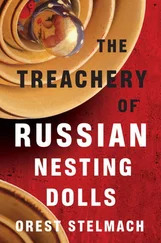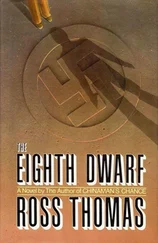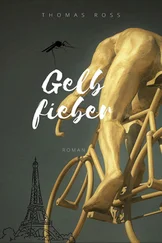It was Nick Patrokis who officially identified General Vernon Winfield after the Metropolitan Police found him dead of a self-inflicted gunshot wound. The body lay not far from the large ornate desk in the library, which Partain had guessed contained 9,000 books.
The homicide sergeant was Frank Tine, a tall light brown man of at least 40 who wore a handsome shockproof face and clothing chosen for comfort and warmth by someone, perhaps himself, perhaps his wife, who didn’t want him to go around looking all that handsome.
“Know how it looks to me?” Tine asked Patrokis, who stared at the General’s body as a police photographer shot frame after frame of 35mm film. “Looks to me like the General sat down at his desk and wrote it all out, then got up and walked over here and shot himself so he wouldn’t splatter anything on that new will of his that leaves everything to” — Tine looked down at his notes — ”the Victims of Military Intelligence Treachery, whatever the fuck that might be.”
“VOMIT,” Patrokis said. “He was one of its two founders. I’m the other one.”
“He also wrote something else.”
Patrokis didn’t ask what and looked around the huge room to see whether anything looked different. He decided that it looked as if somebody had died.
“Want to know what else he wrote?” Tine said.
“Sure.”
“A confession.”
“That he killed Emory Kite? Yeah, I heard that.”
“How the hell’d you hear he wrote a confession?”
“I didn’t. I heard he admitted he’d killed Kite. Mrs. Altford called me. After she called you.”
Sergeant Tine nodded and turned slowly all the way around, as if inspecting, maybe even appraising, the library. “Think he’d read all these books?”
“Most of them probably.”
“How much you think he was worth?”
“I think he was damn near broke and had been for some time.”
“Big house like this?”
“It’s got a maximum mortgage on it.”
“That mean you VOMIT folks aren’t gonna get much?”
“Probably nothing,” Patrokis said.
“Why d’you think he killed Kite?” the Sergeant asked, his tone lacking all curiosity.
“I don’t know,” Patrokis said. “Think he was sick?”
“Who — Kite?”
“The General.”
“No. He wasn’t sick.”
“Kite blackmailing him?”
“I doubt it.”
“But that’d give the General a motive, wouldn’t it?” Sergeant Tine said. “Say some pissant private cop’s threatening to ruin your life. That makes you mad enough to go do something about it. But you don’t think it through. And the glow from getting even lasts about two minutes, maybe less, before it hits you what you’ve really gone and done. So you go tell somebody about it, maybe your oldest friend, maybe this Altford lady, and then you go home, write some stuff, think if there’s anything else you ought to do, decide there isn’t except one last thing and you go ahead and do it.”
The Sergeant gave the big room another appreciative examination before he asked, “How many books in here, you think?”
“About six thousand.”
“That many?” he said, looked around some more, then turned back to Patrokis and said, “And the dumb funny thing about all this is that it happened to somebody who, from the looks of things, had it all, all his life.”
“He did have it all,” Patrokis said. “It’s just that he was never quite sure what to do with it.”
“Like we would,” Tine said.
Patrokis smiled slightly. “Like we would.”
The only item not packed and ready for travel was the black leather overnight case that contained the one-point-two million dollars. It lay on the bed in Millicent Altford’s hotel bedroom, its top flung carelessly back, its suspect contents indecently exposed.
Partain watched as Altford, wearing tailored jeans, a thick white silk pullover and her dark gray cashmere topcoat, picked up two of the bound packets of $100 bills that contained $5,000 each, hesitated, picked up another one, turned, went over to Partain, grabbed his right hand and slapped the three packets into his palm.
“Too much,” he said.
“That’s for me to decide,” she said, picked up a bottle on the room’s dresser, poured its remaining two and a half ounces of Scotch into a pair of glasses, handed him one and asked, “You going back to L.A.?”
“In a day or two.”
“Well, you’ve got a first-class ticket with an open return, so take your time.”
“Jessica around?” he asked.
“Somewhere,” she said, finished her drink, put the glass down,went over to the bed, lowered the lid on the money case and zipped it closed. She wanted to lock it but had no key and asked Partain, “What d’you think? Carry-on or check it through?”
“Check it through unless you want some security X-ray taking a peek inside.”
There was a firm knock at the door of the suite’s sitting room followed by the voice of a bellman announcing his presence. Altford hurried into the sitting room and opened the corridor door. The bellman was a young Latino, who smiled winningly and said, “Luggage?”
“In the bedroom.”
He nodded, hurried into the bedroom, grinned at Partain, picked up Altford’s suitcase, then indicated the black overnight case on the bed and asked, “This too?”
“That too,” she said.
He picked it up, sagged to one side because of its unexpected weight, said, “Heavy, no?” and was gone.
After the corridor door closed, Millicent Altford examined Partain briefly. “You wanta work for me steady?”
“Doing what?” he said, finished his drink and put the glass down.
“Who knows?”
“What’s it pay?”
“The same as a light-colonel’d make.”
He grinned. “I’ll let you know.”
She nodded and left him with a smile and a conspiratorial wink. After he heard the corridor door in the sitting room close, Partain picked up the bedroom phone and dialed a number that was answered on the third ring.
“It’s Edd Partain, Shawnee. What’d you decide about dinner?”
“Wouldn’t miss it for the world,” said Shawnee Viar.
Partain was wearing his new blue suit, a new white shirt, one of his two new ties and the Kevlar vest when Shawnee Viar picked him up in her gray Volvo station wagon at 7 P.M., just north of the Mayflower entrance.
Partain handed her the nicely drawn Xeroxed copy of a map to General Walker Hudson’s house that someone had left in his hotel box. Shawnee looked at it for a long moment with the aid of the dashboard lights, nodded and said, “Yeah, I know where it is. Out there it’s half-acre lots, pools, pine trees, dogs and not quite enough room for a horse.”
After going through Georgetown they crossed Key Bridge, turned onto the George Washington Memorial Parkway and eventually turned left onto a twisting blacktop that went on for 1.7 miles until they came to the promised curb mailbox with a coxcomb of wooden letters that spelled “Hudson.”
A fairly long paving-block drive led up to a sprawling one-story stone house with an immense chimney and extremely wide eaves. The builder had left as many pines as possible and there was only a trace of a proper yard.
“What if—” she said.
“I don’t know,” Partain said, not letting her finish.
She stopped the Volvo at the top of the drive in front of the entrance, then switched off the engine and the headlights. Two lanternlike fixtures glowed on either side of the entrance door, which appeared to be made from thick slabs of oak.
Partain got out first. Shawnee came out more slowly, wearing a long tan raincoat that almost met the tops of her speed-lace boots. Partain had no idea what was beneath the buttoned-up raincoat. Maybe shorts and a tank top. Maybe even a dress.
Читать дальше












